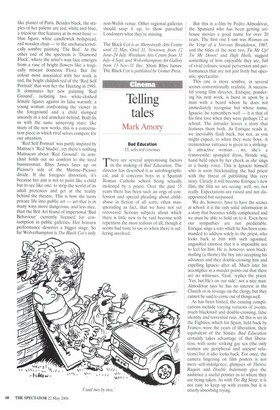Telling tales
Mark Amory
Bad Education 15, selected cinemas
There are several unpromising factors in the making of Bad Education. The director has described it as autobiographical, and it concerns boys in a Spanish Roman Catholic school being sexually molested by a priest. Over the past 15 years there has been such an orgy of confession and special pleading about childabuse in fiction of all sorts, often masquerading as fact, that we have not yet recovered. Serious subjects about which there is little new to be said become with repetition the most tedious of all, though it seems bad taste to say so when there is suffering involved.
But this is a film by Pedro Almodovar, the Spaniard who has been getting arthouse movies a good name for over 20 years. The first one I saw was Women on the Verge of a Nervous Breakdown, 1987, and the titles of the next two, Tie Me Up! Tie Me Down! and High Heels, suggest something of how enjoyable they are, full of vivid colours, sexual perversion and performances that are not just lively but operatic, spectacular.
This one is more sombre, in several scenes conventionally realistic. A successful young film director, Enrique, pondering his next work, is burst in upon by a man with a beard whom he does not immediately recognise but whose name, Ignacio, he remembers well — it is that of his first love when they were perhaps 12 at school. The intruder leaves a story that features them both. As Enrique reads it, we inevitably flash back, but not, as you might expect, to when they were boys. A tremendous entrance is given to a strikingly attractive woman . . . no, she's a transvestite: spangled dress, blonde wig, hand held open by her cheek as she sings in a husky voice. This is Ignacio himself who is soon blackmailing the bad priest with the threat of publishing this very story. Clearly it will become Enrique's new film, the film we are seeing; well, no, not really. Expectations are raised and not disappointed but surpassed.
We do, however, have to have the scenes at school; it is the only solid information in a story that becomes wildly complicated and we must be able to hold on to it. Even here our sympathies are not predictable. Enrique sings a solo which he has been commanded to address solely to the priest, who looks back at him with such agonised, anguished emotion that it is impossible not to feel for him. He is, however, soon blackmailing (a theme) the boy into accepting his advances and then double-crossing him and expelling Ignacio after all. Much later his accomplice in a murder points out that there are no witnesses. 'God,' replies the priest. 'Yes, but He's on our side': not a nice man. Almodovar says he has no interest in the Church or in revenge on the clergy, but they cannot be said to come out of things well.
As has been hinted, the ensuing complications include varying versions of events, much blackmail and double-crossing, false identity and torrential rain. All this is set in the Eighties, which for Spain, held back by Franco, were the years of liberation, their equivalent of the Sixties. Bad Education certainly takes advantage of that liberation, with some striking gay sex (the only women are peripheral and ancient relations) but it also looks back. For once, the camera lingering on film posters is not mere self-indulgence; glimpses of Therese Raquirt and Double Indemnity give the audience a useful pointer as to where they are being taken. As with The Big Sleep, it is not easy to keep up with events but it is utterly absorbing trying.


















































































 Previous page
Previous page